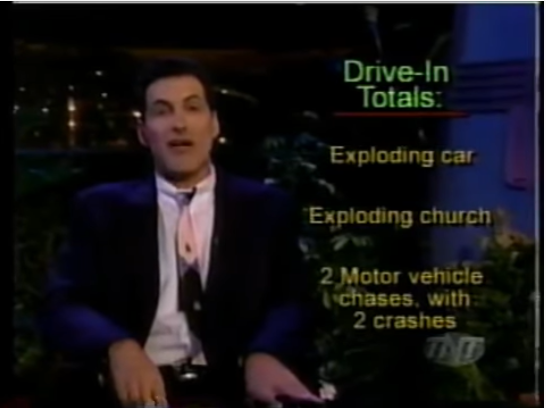
Trailers From Hell has been one of go-to pieces of comfort entertainment for several years. It provides me with things I will never tire of: informative and entertaining commentary on old movies from veteran filmmakers (including Joe Dante, Edgar Wright, John Landis, Guillermo Del Toro, and…the guy who directed A Talking Cat!?!), with a particular focus on goofy old genre stuff. I could listen to Joe Dante describe every terrible double bill he went to as a kid over black-and-white footage of cheap monster movies for hours. The commentators for the site are passionate about their subjects, even if their subjects are films that are barely worth the effort—and maybe just explaining the movies while the trailer plays is the best way for aficionados to share these underdogs of the medium while saving people from, you know, actually having to watch movies like Giant From The Unknown and Bela Lugosi Meets a Brooklyn Gorilla. Even the worst movies can be made interesting, for a few minutes at least, when put into proper context—they’re part of the history too, you know.
I love learning about those cheesy old monster movies and Sci-Fi nonsense, and can even listen to facts about a beach party film or two, and TFH directly taps into something that was instilled in me a long time ago. I am maybe from the last generation who grew up with those sorts of movies still being used to fill up time on TV channels (even back when they still did sign-offs), although when I was a kid it was mostly on specialty cable channels rather than the local stations (side note: our local station closed down over ten years ago.) To think, there was once a time when there was so little available content for a channel to air that they could cycle in a random B-movie from the fifties to the seventies (or earlier! Or later!) at ten PM, something from one of the film grab-bags they’d buy from movie studios, and no one would be the wiser. As one of those darn Nineties Kids (or am I considered a Millennial? It’s almost as if these labels are arbitrary marketing buzzwords), I was exposed to a surprising amount of TV and film history just by being bored and channel-surfing—tuning in and unexpectedly finding old Toho or Ray Harryhausen movies is probably one of the main reasons I’m a creature feature fan to this day. These were things that looked nothing like the big movies that were constantly being advertised on those same channels, but I don’t think I ever thought of them as just being “old.” A movie was a movie, and if it had something that interested me—such as, I don’t know, a dinosaur, or a skeleton—then I kept watching. Rarely did I see any of these things more than once, either, which only added to the mystique of these showings. They were my one opportunity to see something I had never heard of before, and (until I had Internet access and could look them up), would likely never hear about again.
TFH, in its way, also reflects other traditions in B-movie showcasing. There used to be a lot of movie package features, especially horror-themed ones, that had a host—your Elviras, your Svengoolies—to give these showings an extra dose of personality. For multiple decades, these hosted programs introduced kids watching TV at night to creature features from another era, creating the next generation of fans. That was a tradition that ended way before my time, but I did get to experience the programs that took inspiration from those older ones. The example from my childhood was a show called “The SpaceBar” on the channel Space, the Canadian equivalent to the US Sci-Fi Channel (pre-SyFy), where an alien, a sassy robot head, and a holographic bartender would introduce a selection of movies on Friday night (or maybe Saturday? I can’t remember) and provide trivia or humorous commentary during the commercial breaks. They actually showed a pretty wide variety of movies—it was the place where I saw King Kong vs. Godzilla for maybe the first time, and also a double bill of the animated Richard Adams violent animal duology, Watership Down and The Plague Dogs (have a nice weekend, kids!) These were movies that Space (now called CTV Sci-Fi, to show that Canada is also a corporate branding hellscape) might have shown during their usual movie slots (usually weekend afternoons), but the added colour provided by the host segments made the viewing that much more engaging. It didn’t even matter how good or bad the actual movie was, because the hosts would say the exact things you were thinking—it was like watching it with a few movie buff friends.
Recently, I fell into a Youtube hole watching the host segments from TNT’s MonsterVision, the channel’s mid-to-late nineties repository for late night horror and genre films hosted by veteran cult movie commentator Joe Bob Briggs. TNT was a channel that wasn’t available in Canada as far as I know, so the whole MonsterVision/Joe Bob Briggs phenomenon was new to me—yet the format still fills me with such a warm sense of familiarity, likely because it comes from the same pool of inspiration as The SpaceBar. MonsterVision had a similar slate of movies to fill its timeslot, which ranged from well-known to (sometimes rightfully) obscure, classy to crass-y, and all over the map in terms of quality, although Briggs has his mathematical formula to determine a movie’s worth, the “Drive-In Totals”, which he counted off during his segments. In this way, big budget Hollywood flicks could stand on equal ground with lower-budget cult movies, which are clearly more of Briggs’ forte. Those showings were always double features, with obvious combos (Ghoulies with Ghoulies II) more interesting or thematic ones (a Harryhausen night with Sinbad and the Eye of the Tiger and Clash of the Titans) or ones that make little sense at all (Return of the Living Dead followed by Jaws II, or Highlander preceded by…Look Who’s Talking Too.) These programming choices are often commented on by Briggs, who not only jokes about the movies, but about the actions of the network itself (which does include many mocking references to Ted Turner himself, a common pastime for Turner-employed creative types)—especially the channel’s choice in censorship, as he frequently reminds the viewers how much nudity they won’t be seeing on TNT (while also critiquing where the commercial breaks were inserted.) This gives the show the interesting angle of being both properly curated, and also subject to the whims of the network, which these sorts of shows always were, but rarely commented upon. Briggs brings plenty of knowledge of the history of horror films, as well as a distinct comedic personality, which is why he still gets to do this sort of thing even now in the streaming age, recreating his show on the service Shudder.

It’s the enthusiasm that makes these things work, whether it’s the good-natured commentary of Trailers From Hell or the more acerbic tough love of MonsterVision. In either case, they’re introducing people to movies they probably haven’t heard of—and, more importantly, finding a way to take something that a lot of people would dismiss out of hand and finding reasons they’re worth knowing about at all. That may just mean having some fun knocking the cheap and lazy films of yesteryear (or today, why not) or, in some cases, bringing attention to obscure movies that actually deserve your time—both represent the general joys of movie-going. This is the sort of thing you kinda have to seek out on your own these days, as TV has easy access to so much more mainstream and modern content that they never have to show another obscure old movie ever again (with a few exceptions, like another Turner-originated network, TCM), but I will always appreciate having had the chance to see the last of the old guard, who just had to work with what was on hand more often than not, but relished it. That means I got to see a lot more of everything, soaking in the same kind of experience that my creature feature-loving predecessors did. With the stuff then and now, it feels like I’m learning from the masters, who are always willing to share everything they know and continue to spread that enthusiasm among the rest of us.